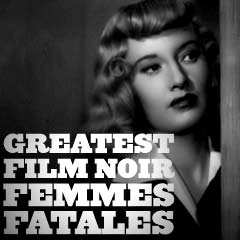
|
|
(chronological by film title) Introduction | Picture Guide | 1941 | 1944 | 1945 | 1946-1 | 1946-2 | 1947-1 | 1947-2 1948 | 1949 | 1950-1952 | 1953 | 1954-1956 | 1957-1959 |
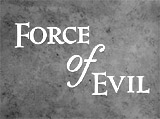
|
Force of Evil (1948)
This uncompromising, melodramatic post-war film noir and crime drama from Abraham Polonsky (his debut film) was narrated and told in documentary style. It was one of the few Hollywood films at the time with a devastating critique of capitalism. Shortly later, Polonsky was blacklisted for being an uncooperative witness before HUAC in 1951, and didn't direct any more feature films for almost 21 years. The cynical film opened with a stunning voice-over monologue delivered by the silky-smooth voice-over of young, ambitious, successful, and on-the-make Wall Street lawyer Joe Morse (John Garfield). As he first spoke, the camera presented a high-angle camera view of towering, monolothic skyscrapers surrounding and overwhelming Trinity Church near Wall Street. Morse described how his principal client was Ben Tucker (Roy Roberts), the crime boss of a numbers racket. He had corrupt dealings with Tucker and was on the verge of making millions through a race-track betting scam-fix so that the winning lottery number on July 4th would be 776. Because so many superstitious bettors would make that bet, it would cause the many small numbers banks to go bankrupt and allow crooked Tucker to emerge as the city's #1 racketeer:
Citywide, racketeers were up against Link Hall (Arthur O'Connell), the city's new special prosecutor, who was on a crusade to eliminate numbers runners. However, as a self-proclaimed lawyer for the numbers racket, Joe was interested in becoming wealthy by making the racketeering legal for his Tucker Enterprises, Inc. client: "We've got a big retainer to change the numbers racket into a legal lottery." In this Cain and Abel tale, Joe's very honest, estranged older brother Leo Morse (Thomas Gomez) (with a weak heart) remained in the Lower East Side slum neighborhood where they had grown up. He maintained a local "small numbers bank" of his own, and refused to join the corrupt dealings of his younger brother. Leo refused a proposed alliance deal with the corrupt corporation, and accused Joe of blackmail: "Do you know what that is, Joe? Blackmail! That's what it is! Blackmail! My own brother blackmailing me!" Joe angrily responded, calling his brother a "small man" for not wanting it. Leo emphatically rejected the offer: ("I’ll give you my answer, calmly and sensibly. My final answer. My final answer is finally No. The answer is No. Absolutely and finally No. Finally and positively No. No! No! No! N – O!"). Joe maintained a romance with Leo's secretary-bookkeeper, working-class girl Doris Lowry (Beatrice Pearson), who was attracted to his fast and slick life-style. On July 4th as predicted, bankruptcy struck all the small numbers banks in the city, including Leo's business, and he was reluctantly forced by Joe to ally himself with Tucker's operation. However, Leo's meek bookkeeper Freddy Bauer (Howland Chamberlin) refused and threatened to divulge the location of Leo's newly-reorganized and overtaken mob bank to the special prosecutor Link Hall. Although she had only a few minutes on-screen, mob boss Tucker's sultry femme fatale wife Edna Tucker (Marie Windsor) was working behind-the-scenes to manipulate and torment Joe. About 42 minutes into the film, she appeared in Joe's office with long black gloves and a breathy voice to deliver "bad news." She informed him that special prosecutor Link Hall was wire-tapping into her husband's phone. She hoped to catch the authorities in the act of listening in - (indicated by picking up the receiver and hearing a "little click"). She badgered him about the wire-tapping threat - and insinuated that he might have been indiscreet himself: ("You might spend the rest of your life trying to remember what you shouldn't have said") until he became exasperated with her: "What are you riding me for?"
She also personally inquired about Joe himself, and sexually taunted and belittled him about his manhood, when he asked about her motivations:
Fearing her strong-armed husband, Joe preferred to stay alive rather than give in to his partner’s seductive wife, so he summarily dismissed her. After she departed, he checked his desk phone and to his horror realized it was also tapped when he heard a "little click." As the film progressed, Joe slowly began to realize that the law was closing in on him. He also knew he had become indebted to the syndicated mob for life and was one of its corrupted victims, as he took a walk in a deserted Wall Street (amidst towering buildings). Shortly later, he read newspaper headlines that Leo's bookkeeper Freddy Bauer had been killed and that Leo had been kidnapped (shortly later he died of a heart attack) by Tucker's business rival Ficco (Paul Fix). In retaliation during a major confrontational shoot-out, Joe was able to seek vengeance on both Tucker and Ficco (who had joined forces together). After Ficco shot and killed Tucker, Joe killed Ficco (for murdering his brother). Toward the film's conclusion, Joe (with Doris) searched for the body of his estranged brother Leo - passing factories and a meat-packing area, ending with his running down a great stone staircase - almost a descent into hell - from Riverside Drive down to the rocks by the Hudson River lighthouse under the George Washington Bridge, where he found the dumped body of Leo. He described his descent in voice-over, and how he would now turn himself in to Link Hall:
After finding Leo's body, Joe was determined to find justice for his brother by working with Link Hall to end corruption. He and Doris walked off, arm-in-arm, to an uncertain future. |
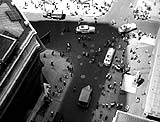 High Angle Shot: "This is Wall Street..."  Headlines: Special Prosecutor Link Hall To Drive Out Numbers Racketeers 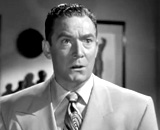 Crime Boss Racketeer Ben Tucker (Roy Roberts)   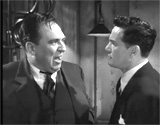 Lawyer Joe's Threatening Proposal to His Brother Leo, and Leo's Emphatic No! 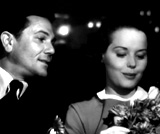 Joe's Relationship with Doris (Beatrice Pearson) 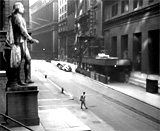 Joe's Walk Through Deserted Wall Street 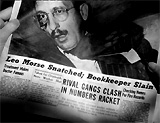 Headlines: "Leo Morse Snatched; Bookkeeper Slain" 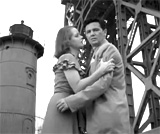 Ending: Joe Walking Away with Doris to Seek Justice |
||||||||||||
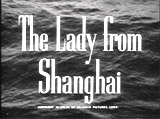
|
The
Lady from Shanghai (1948)
This imaginative, complicated, unsettling film noir and taut who-dun-it thriller was a tale of betrayal, lust, greed and murder set within a deadly love triangle. In the film's opening, out-of-work, gullible, wandering Irish seaman Michael O'Hara (Orson Welles) delivered the opening voice-over narration:
He first met the seductive, alluring, mysterious, and beautiful femme fatale: she was short, wavy blond-haired Elsa Bannister (Rita Hayworth) wearing a polka-dotted white dress, riding under the black hood of a horse-drawn carriage on its way to New York's Central Park. He was called upon to rescue her from a hold-up. His fanciful name for her was Princess Rosalie. He recollected her - in voice-over:
After her rescue, she offered the between-jobs sailor employment as a crew member on her sailing vessel to the West Coast via Panama, owned by her crippled (physically-paralyzed), celebrated but asexual and older San Francisco lawyer - and pimp husband Arthur Bannister (Everett Sloane). While on the deck of the yacht one night, while wearing a black two-piece swimsuit, Elsa sang the haunting torch song "Please Don't Kiss Me" ("Please don't love me, but if you love me, then don't take your lips or your arms or your love away"). Lecherous, weirdly insane, paranoid and sweaty George Grisby (Glenn Anders), Bannister's business partner, offered Michael $5,000 in return for a diabolical murder scheme -- to sign a phony murder confession for Grisby's own demise (or planned disappearance). With the money, the foolish Michael fantasized about "running off with you [Elsa] to a desert island to eat berries and goat's milk." Afterwards, Michael secretly met with Elsa in San Francisco's Steinhart Aquarium, where ominous sharks and predatory fish swam behind them, as she encouraged her "beloved fool" to elope with her after the murder plot, as she begged:
In the complicated plot, when the fabricated 'murder' plot fell apart, Michael realized he was the fall guy for Grisby's murder and that a vengeful Bannister was now representing him as his defense lawyer! ("Either me or the rest of the whole world is absolutely insane"). He also realized that the villainous Elsa was Grisby's actual killer - a murderous femme fatale. The film climactically concluded with a visually-intriguing confrontation and shoot-out in the famous kaleidoscopic Crazy House-Hall of Mirrors, an abandoned, off-season amusement park. There was a deadly gunfight confrontation between blonde femme fatale Elsa and her abusive, crippled, wealthy lawyer husband Arthur Bannister as O'Hara watched. Bannister, delivered an ominous speech to blonde femme fatale wife Elsa before firing commenced:
The couple self-destructively drew their guns and shot at multiple likenesses of each other, as the screen erupted into a wild kaleidoscope of smashed glass, multiple fractured and distorted mirrors that broke and shattered, and they both mortally-wounded each other. Their aim was confused by the contradictory mirror images that broke into splinters during the wild shooting as one fake image splintered and another replaced it. Still in character, Bannister uttered his last words: ("You know, for a smart girl, you make a lot of mistakes. You should have let me live. You're gonna need a good lawyer").
Witnessing the double murders as he stepped back and watched them destroy each other, Michael was horrified by the shattering of glass as the deceptive facades of their evil images were reflected and then blown away - and all that was left in the violent shoot-out was their guilt, greedy hunger, pain and misery. Elsa stumbled with Michael into another room where she engaged in her last exchange with Michael during a prolonged death scene. It was filmed at ground level down next to her on the floor, as she agonized over her death. He recalled their conversation in the streets of Acapulco about the badness of the world, and his fishing tale about blood-thirsty sharks. She admitted her own "original nature" had delved into corruptness and evil, and that she had surrendered to "badness"; but her pleading failed to gain his sympathy, even after an appeal to his sentimentality:
Unhooked from her charming and fatal attraction, Michael abandoned her. While she pleaded with him, he walked away (to call the police) and left her to die alone. He predicted that he might become more ambivalent, forget Elsa and put her corruptive influences behind him - if he grew old enough.
The film ended with his musing:
|
|
||||||||||||
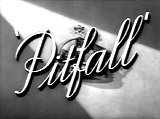
|
Pitfall (1948)
This domestic noirish tale by director Andre de Toth regarding the archetypal American Dream was a cautionary treatise on domestic entrapment and the urge of temptations for a philandering husband outside of marriage. It involved an unfulfilled and discontented married insurance man's deadly affair with a doomed and imperiled blonde (while her spiteful boyfriend was in jail) that led to deceit, guilt, recriminations, and multiple murders. In post WWII Los Angeles, Olympic Mutual Insurance salesman John "Johnny" Forbes (Dick Powell), a suburban middle-class married man (to his high-school girlfriend Sue (Jane Wyatt)), had an idyllic life: ("You were voted the prettiest girl in the class. I was voted the boy most likely to succeed"). But he found his "old man routine" suburban life was stuck in a 9-5 rut that was "six feet deep." He complained: "Sometimes I get to feel like a wheel within a wheel within a wheel." He was dissatisfied with his American dream: "I don't want to be an average American, backbone of the country." His mid-life crisis intensified when he took an insurance embezzlement case that had been uncovered by the insurance company's suspicious and seedy private investigator and ex-cop J.B. 'Mac' MacDonald (Raymond Burr), working for a detective agency. The embezzlement case involved a major department store insured by Forbes' company. There was an effort to reclaim the ill-gotten gifts purchased by an embezzler for his girlfriend using about $10,000 in stolen funds. Only $4,000 worth of merchandise had been recovered. The embezzler was Bill Smiley (Byron Barr), a convicted bank-robber. He was spending lavishly for his girlfriend - sultry 23 year-old blonde Mays Dept. Store fashion model Miss Mona Stevens (Lizabeth Scott) in Santa Monica, CA. While investigating, MacDonald had already set his eyes on Mona's appeal: "I don't blame him for robbing his company. She's worth it." Smiley had bought her numerous items with the money: ("A lot of little pretties, fur coat, little things like that"). Smiley was sentenced to a year in jail, and had already been jailed for four months, and was about to be paroled in two months. Forbes dismissed MacDonald from the case, knowing his only interest was in Mona: "Your part of the job is finished, Mac. The company will handle it from here....You'd string it along just see the girl again." That afternoon, the case brought Forbes into direct contact with the embezzler's girl Mona - he went to Mona's apartment to reclaim the gifts. Before he saw her, he glanced through "samples" of her modeling agency swimsuit photos in a notebook. When questioned about the gifts, she vowed her innocence: "I didn't ask him for any of those things....You'd have a hard time proving that any of those gifts were bought with stolen money." She confessed that some of the items were in her possession: "I've got a fur coat, a car he made the down payment. I got a few dresses and an engagement ring." She initially denounced the cold-hearted agent as a 'strictly-business' conformist: "You're a little man with a briefcase. You go to work every morning and you do as you're told." To gain sympathy from him, she attempted to soften him up: "If you are a nice guy, you'd cry a little bit with me....You'd act a little human." He spent a day on the femme fatale's Tempest speedboat and enjoyed afternoon cocktails and a late dinner with her as their implied adulterous romance started to develop. The speedboat, named after Mona (the Tempest herself), was one of her expensive embezzled gifts that she prized the most.
Once he had fallen for Mona, Forbes ignored and falsified his report, and the next afternoon, it was noted that he purposely failed to list the speedboat as one of the items to be re-possessed. The seedy MacDonald had stalked and followed them the night before - lurking and keeping tabs on their relationship and Forbes' lack of thoroughness with reporting all gifts. Mac noted that the speedboat wasn't listed in the items, although he had its bill of sale. He also told Forbes about his obsession with Mona: ("But for me she's got everything"). After work, Forbes returned to Mona to personally and kindly inform her that the speedboat was repossessed earlier in the afternoon. He blamed its return on MacDonald who would have caused trouble if he didn't. She complimented him on his improved personality: "You're not at all like the man who walked in here yesterday." She spontaneously kissed him. Jealous of Johnny's romantic success with Mona, the sadistic MacDonald was prowling around outside Johnny's garage when he returned home that night. He admitted his determined obsession for Mona ("I told you I like that girl"), and then brutally beat Forbes up. He also threatened to disclose the secret affair between Johnny and Mona: ("Maybe this will keep you home where you belong for a few days"). And then knowing he'd be fired, Mac abruptly quit. The next day, Mona was shocked to learn that Forbes was married when she drove to his home to deliver his left-behind attache-briefcase in her apartment, and some good cheer and chicken soup. (He had remained home from work, reporting in ill after his brutal beating and claiming he had been robbed). After recovering, he met with Mona in the bar where they earlier had cocktails, and revealed that she knew he was in a happy marriage with a loving wife and son Tommy (Jimmy Hunt). She sensibly broke off their affair and sent him back home, telling him that she didn't want to compete with a wife and child, and that she wasn't going to cause a "nasty" breakup:
The stubborn-minded Mac continued to pester Mona at her work and at her apartment, demanding her attention. She refused interest in him: ("Don't waste your time. I'm simply not interested...I don't like you. I don't want you around"). When he ignored her, she threatened to call the police, but he retorted: "You wouldn't want to cause Johnny and Mrs. Forbes any trouble, would you?" Mona told Forbes about Mac's intrusiveness: ("He just won't leave me alone"). Johnny was prompted to retaliate by beating up Mac and offering him an ultimatum: ("It's just a warning, Mac....Leave the girl alone. Stay away from her. And if I ever hear that you've threatened to do anything about my family again, I'll kill you, Mac"). Mac concocted a devious plan to provoke a confrontation - he would let Smiley know before his parole release (with help to bail him out early) that Mona was involved in an affair with Forbes - an insurance man: ("I guess your girl kind of took a fancy to him"). Prior to Smiley's discharge or release, MacDonald visited him and filled him with suspicions about Mona's affairs, and even Smiley began to doubt Mona. And then on the day of his release, 'Mac' incited the increasingly-agitated Smiley to commit violence by getting him hopped up on booze, and by providing him with a gun, in order to confront Johnny at his home. When Smiley met up with Mona in her apartment the day of his release, he asked her about Mac's intentions: "Why does he want me to kill Forbes?" She responded that due to her affair with Forbes: "He's jealous of him." Even though Mona apologized for her indiscretion with Forbes and told him: "We all make mistakes," her response enraged Smiley even further to become belligerent and seek retribution. Mona was able to warn Johnny about the threat: "I don't want him hurt, Johnny. I don't want him thrown back in jail." The film ended with Johnny awaiting Smiley's late night arrival in his darkened living room. He gunned down the persistent ex-con (driven to the home by Mac) after he was warned to leave and then broke into the Forbes home through a window. Johnny admitted to Sue: "I just killed a man" and claimed it was a "prowler." Mac returned to Mona's apartment. Now believing that his path had been cleared by eliminating his two rivals: ("Was a thousand to one shot I'd get rid of both of them at once"), Mac attempted to force Mona to run away with him to San Francisco and Reno ("So it's me you end up with"). She adamantly refused and after he told her: "I really love you," she shot him twice and seriously wounded him. To Sue, Johnny confessed his cover-up of lies and his poor judgment in engaging in a brief affair with Smiley's girlfriend, and that he deserved what had happened. He told his long-suffering, dutiful and devastated wife that the "prowler" was in fact the vengeful, just-released boyfriend of his illicit lover: ("He had good reasons for wanting to kill me, Sue....This man Smiley just got out of jail today and somebody told him a lot of things about her and me"). To protect the family and maintain the illusion of their perfect family, Sue urged Johnny to deceitfully plead that Smiley's murder was self-defense: "If you drag this family through the dirt, I'll never forgive you." After a night of walking the street alone, John confessed to the killing of Smiley to the District Attorney (John Litel) in the Hall of Justice. He was exonerated with the rationale of 'justifiable homicide': ("It so happens the homicide you committed was justifiable. Bill Smiley was coming to kill you"). In contrast to Forbes' lack of charges, Mona was charged with a possible homicidal act: ("If he dies, it's one thing. If he doesn't, it's another") - even the DA admitted it was a double standard of punishment.
Outside the Hall, Sue picked up Johnny and discussed how divorce was a serious consideration, but then dismissed the idea and was willing to forgive, as she explained to her husband: "If a man has always been a good husband except for 24 hours, how long should he be expected to pay for it?" She suggested that Johnny ask for a job transfer, to move to another town to begin anew. Their relationship was damaged and forever marred by his unfaithfulness, but they were both willing to try again:
Mona's fate, however, was much more uncertain. |
|
||||||||||||